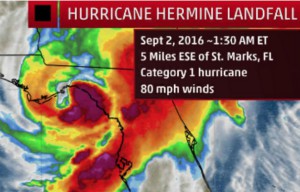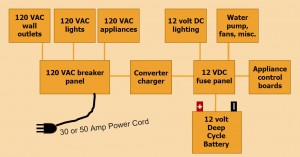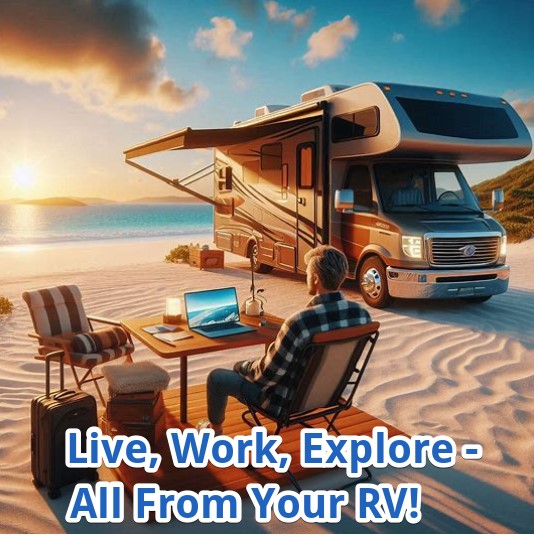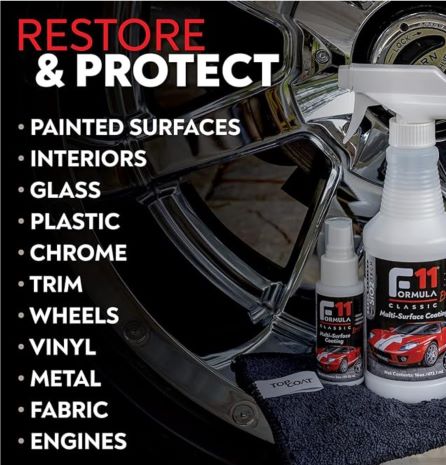Evacuating From a Hurricane
One thing we have to deal with when visiting Florida and staying along the Gulf Coast is Hurricanes!
In our almost nine years of full time RV living, we have had to evacuate from the RV park we were staying in twice! A few days before the Labor Day weekend made it number three!!
We had been watching this tropical depression for almost three weeks as it was looking like it was going to be headed into the Gulf of Mexico. Towards the end of August, it passed the Florida straights and started its turn towards the Florida panhandle.
Having been hanging around Florida for almost thirty years, we have learned to pay close attention to these storms and heed the advice of the reporting agencies. These storms are highly unpredictable, and if asked to evacuate it is best to do so!
The great thing about an RV home is that it is easy to do just that!
Once Hermine was a day out, and it was going to make landfall just a bit east of us, we decided to move the RV northwest about eighty miles and hang out at a rest area along I-10. Since we were on the northwest side of the storm the effects were not as severe as those on the southeast side!
It was easy for us to make preparations to evacuate! I hooked up our trailer, disconnected our services, pulled the slides in, raised our leveling jacks, and away we went!!
There are benefits to full time RV living!!
Purple Monkeys and RV Travels
So what is a purple monkey? A good friend of ours coined the phrase and uses it in his RV tech courses to describe seemingly troublesome RV problems that appear to have no simple solution, but can be easily rectified if you understand the big picture.
A purple monkey sits on your shoulder representing a big hairy problem that appears to have no easy fix. That monkey laughs at you and tells you that there is no solution to your problem!
Now, of course, there is no monkey on your shoulder! It is just you talking yourself out of being able to diagnose and fix the problem due to a possible lack of knowledge and frustration. You see, most of the issues that arise in the use of an RV are easy to access and easy to fix, well eighty percent of them anyway!
Let’s Focus on Electrical Problems!
Your RV has three electrical systems that all work in harmony to provide for the needs you have in your RV. If one of them fails, it is likely that another will be affected.
The image above represents the harmony between the 12-volt electrical RV house battery system and the 120-volt electrical system.
For example, if your RV has 120-volt power but the 12-volt system is not functioning as it should, the AC units, the RV refrigerator, the water heater, and the furnace will not work. Why is this you ask? Because they are controlled by a 12-volt circuit board that tells these units how to operate.
These are some of the more common questions I receive on a daily basis. Understanding RV electrical systems is very important when diagnosing RV electrical problems, but most RV owners don’t have this knowledge. Do you see how a big purple monkey could be laughing at you if these issues arise when you are traveling in an RV?
Our Recent Purple Monkey
Pam, Lindsey, and I were headed up to the Hershey RV Show in Hershey, PA. It is billed as the largest RV show in the country. We were there last year too. I would have to say the claim is true because of the amount of RV’s that are displayed at the show.
The Tampa RV Supershow that occurs in Florida, in January, is a much larger venue but they don’t have the number of RV’s displayed as at the Hershey Show.
We have been plugged into 120-volt shore power for most of the summer except for occasional one-day trips. Our 12-volt batteries are the originals in our 2013 model year RV. I religiously check and fill the battery cells with distilled water at the first of every month.
In my experience, if these deep cycle batteries are used on a regular basis, and maintained, they are probably good for five years. So, ours should be in good shape for a while longer.
Now, when we boondock (staying in the RV overnight without the availability of shore power, water, and sewer services) we put more of a strain on the house batteries because they are not being charged unless we drive the RV or run the generator.
In our motorized RV, when driving the RV the engine alternator charges the house batteries. When parked, and the generator is running providing 120-volt electrical power to the RV, the RV’s converter charges the batteries
Thursday night, after a day of driving from Atlanta, GA to Statesville, NC, we overnighted in a Walmart. One of our friends calls that Wally-docking! LOL Walmart is one of our favorite places to boondock because we can shop and have a convenient place to stay for a night.
As usual, we ran the generator for the evening while we prepared dinner, watched TV, ran the AC unit, and kept the batteries charged. Once we went to bed we turned off the generator (for safety reasons when it comes to the possibility of CO gasses entering the RV through open windows and vents).
That night it was still a little warm inside the RV so I ran the 12-volt vent fan in the bedroom to draw in the cooler air. It ran most of the night. Usually, no big deal! With the upper sixties temperatures outside the RV, it was very comfortable and we had a good nights sleep.
As I do every morning, when I checked the house batteries, the voltage on the control center was reading 11.8 volts. Hmmmmm! That is lower than I usually see for other times when we have done the same thing.
No big deal! Time to turn on the generator again so we can make the morning coffee and do the other things we needed to do that require 120-volt power. I pushed the button to auto-start the generator and nothing happened!
Uh oh! I knew there was not enough voltage in the house batteries to start the generator. Okay, what next? The chassis batteries were showing a strong charge so I used the battery boost button on the dashboard to bring the house battery voltage up to 12.3 volts.
That should have been enough to start the generator! I tried it again and nothing, the generator would not start! The purple monkey was starting to really laugh at me!
Okay, what next? I decided to drive for a while and see if the alternator could charge up the house batteries even more so they would be strong enough to fire up the generator. After all, one must have his morning coffee!!
Usually while driving the RV, I get a house battery voltage of about 13.8 volts as the engine alternator is charging the batteries while the engine is running. But on this Friday, that was not the case! The purple monkey is now roaring with laughter!
12.3 volts should be enough to start the generator. But at the interior control panel, the button used to start the generator at the electronic control center was not working. The auto-start process would start and error out. I know that the generator only needs 12 volts to turn over so something else must be going on.
So, at this point there appeared to be several purple monkeys having a good laugh at me! But, since I have skills in these areas as an RV inspector and teacher, I know there are other things I could try.
A generator has two places where it can be started. In the case of my generator, I can also start it right at the generator by removing the cover and using the internal start switch. But, before doing that, there are also other reasons why the generator might not start. In this case not likely because it was running the night before.
However, a double check is always a good idea. An RV generator will not run unless it has at least a quarter tank of gas. We filled up the night before so that was not the issue. The other reason it may not start is that there is an issue with the level of the generator engine oil. I checked that and it was fine! I just changed it!
So, after having driven for an hour or so, we pulled into a rest area and I removed the cover for the generator, checked the oil and pushed the start button. It fired right up! Hmmmm! Why did it not start from the inside?
From what I can tell, the electronics froze up. Once the generator was running, all appeared to be well. With the generator running the converter was now charging the house batteries and we were able to run the RV fridge on electric as it had not been run since the night before (we don’t use propane systems while driving).
During travel on Saturday, all seemed fine! I do suspect the house batteries were weakened compared to what they were a year ago. Once we got to Hershey, PA and were boondocking some more, the batteries could no longer handle the usual load. So, we replaced them!
I bought two new ones, pulled out the old ones, cleaned the cable connections, and hooked up the new batteries. It is a very easy thing to do as long as you pay attention to how they are connected before you remove the old batteries!
Knowing how your RV works, understanding its systems, and remaining calm when issues arise is the key to keeping that purple monkey caged! Most times it just takes considering the evidence and using your knowledge about your RV to come up with a solution to the problem.
If you are new to all this, how can you bring up your level of confidence so you can handle the purple monkeys when they show up?
Remember that eighty percent of the problems that arise in an RV are easy to access and easy to fix! This is what I learned from the Texas RV Professor, Mr. Terry Cooper! He offers a five-day hands-on RV tech course that teaches both RV owners and RV technicians the basics so you can handle the kinds of issues I described above!
He teaches it around the country and also offers a live stream for folks that just can’t make the live class.
I attended this class back in February of 2014 prior to launching my RV inspection business. As a full time RVer, I knew some things but I did not know how much I did not know till I attended Mr. Cooper’s class!
If you would like to know more about how you can up your game, you can visit rvtechcourse.com. If you decide to take the class, please tell Mr. Cooper and Evada Cooper that Howard and Pam sent you! They will take extra special care of you!!










Recent Comments